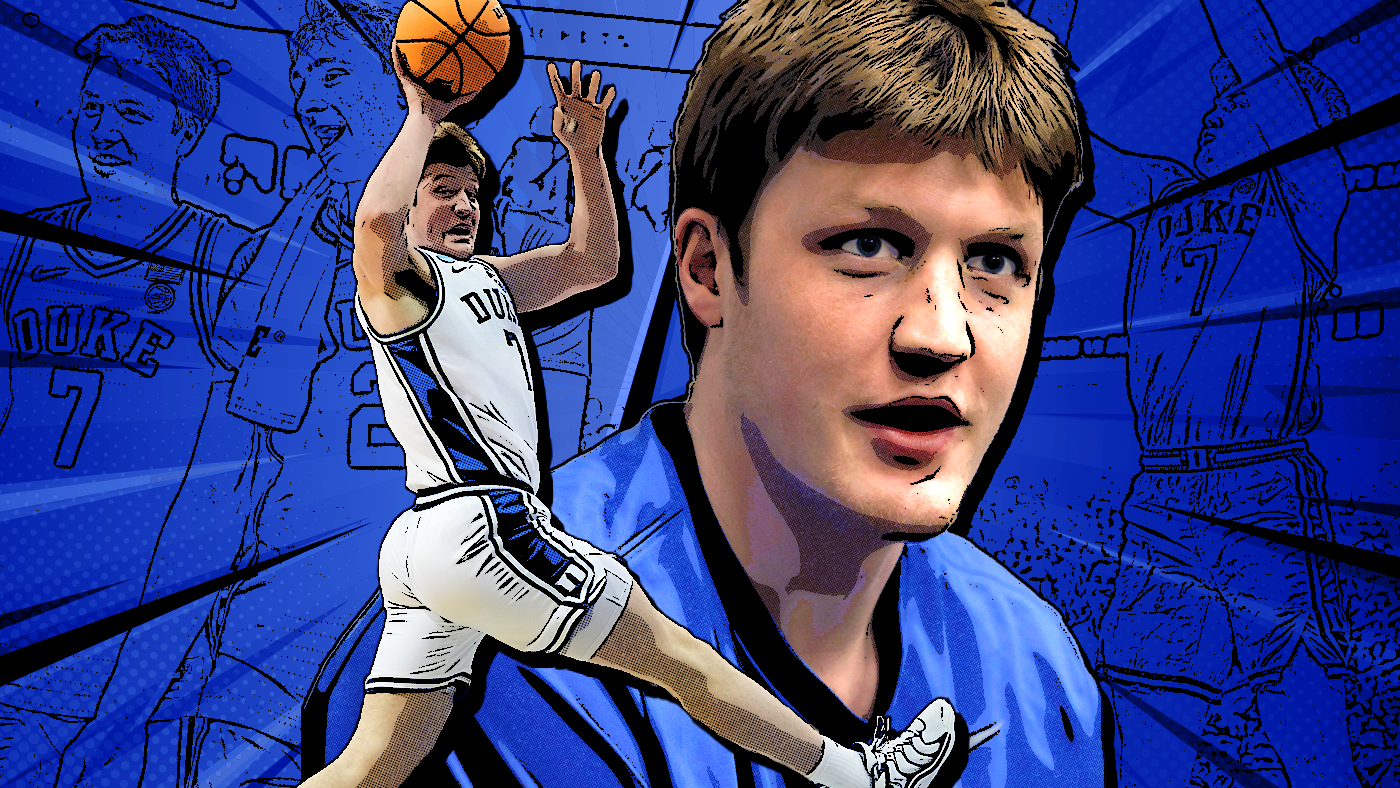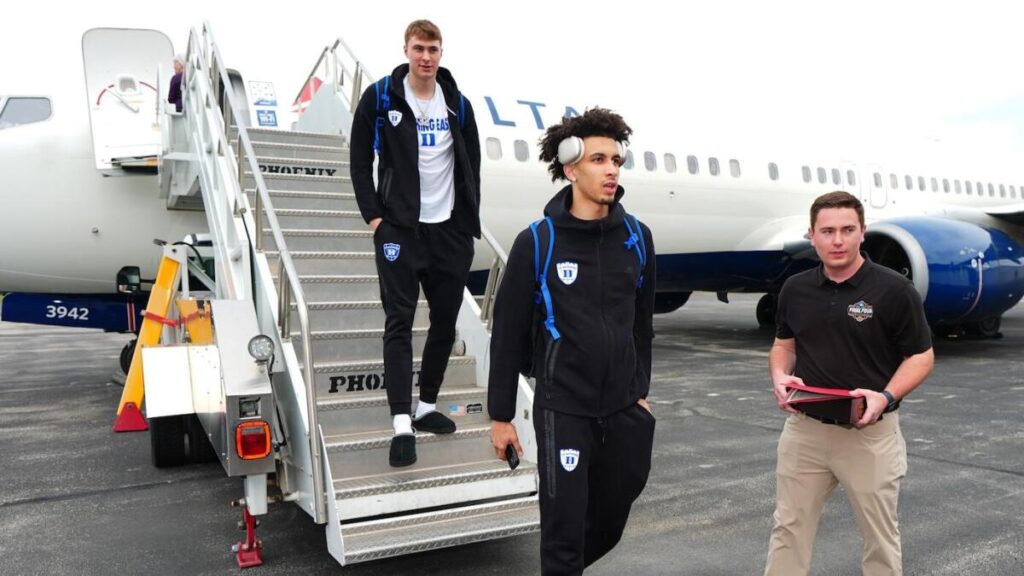SAN ANTONIO, Texas — Milos Uzan wanted the blessing. No, Milos Uzan needed that blessing.
Semantics were key when Uzan eased into this season as Houston’s point guard. Only a few months earlier, the last player to occupy that position, Jamal Shead, had seen his career come to a tragic end. Shead badly sprained his ankle in last season’s Sweet 16 season-ending loss to Duke.
That end, painful as it was, arguably solidified Shead’s spot on Houston’s Mt. Rushmore somewhere alongside Elvin Hayes, Hakeem Olajuwon and Clyde Drexler. Yes, Shead, now with the Toronto Raptors, was that good.
Uzan, an Oklahoma transfer, was Pete Myers replacing Michael Jordan. In other words, he couldn’t. Or least it was going to be difficult. “He’s definitely a big part of the reason why I came here,” Uzan said of Shead.
Uzan chooses his words carefully. His deference is obvious. Shead didn’t have to pass the baton but he did with a relationship that exists to this day heading into Saturday’s Final Four game against Duke (8:49 p.m. ET on CBS; streaming on March Madness Live or Paramount+).
“Early in the year he definitely told me that these boys are going to follow, but you’ve got to go out there and you’ve got to lead. As the year went on my voice got louder,” Uzan said.
The pro has kept in touch with his college, um, replacement. That blessing came.
The irony, of course, is that entering this Final Four, Houston could be better after losing one of its best all-time players. And the solution was not a three-year starter like Shead, it was a transfer from a (departed) Big 12 foe.
High-dollar transfers (and recruits) line the rosters of the four teams remaining, here in San Antonio. It’s one of the factors that helped lead to one of the most stacked Final Four fields ever, a situation where four teams were at the top of the sport for much of the year and carried their No. 1 seed status all the way to the end, the first time all four top seeds have made it this far since 2008. We’re at a jumping off point. Call it a loss of innocence, what little there is in college sports.
There are already millionaires among us. There have been for years since NIL became a reality 2½ years ago. But on Monday – the day of the national championship game — a lot of it changes with the expected eventual approval of the House settlement that could change the entire college landscape.
For the first time, athletes will be paid money by their schools directly for their athletic talents. The existence of good coaches, good players and good guys here this week has distracted us from that future for a moment.
Duke’s Cooper Flagg is easy to root for. Same for Johni Broome, Auburn’s star, when he hurt his elbow last week in the regional final. Florida looks like the reincarnation of the Billy Donovan Gators team that won back-to-back championships 18 years ago.
Thanks to the likes of Kelvin Sampson we still think of basketball first these days. Still, there is that loss of innocence.
“I know how transactional [the game has become] because of the bullies on the internet,” Houston’s coach told CBS Sports. “The [point spread] is whatever and our kids miss a shot and we’re up 22 and the line is 24. I don’t get [the criticism], our kids do.
“We’ve had death threats. We’ve had kids who are told, ‘If we ever see you in public. we’re going to do this, this and this.’ … You try to insulate your kids from the world but because of social media and internet, people can get to them.”
This new age certainly has pit falls. NCAA president Charlie Baker told CBS Sports last year that a College World Series team needed police protection in 2023 because of a gambling threat.
Coaches may or may not choose to deal/negotiate with agents who strike deals coming out of high schools or while transferring. St. John’s coach Rick Pitino, who had two stints as an NBA coach in the 1980s and 1990s, is among those who doesn’t.
“With what I heard a few players are getting right now, I can’t fathom that,” said Pitino who accepted a national coach of the year award here Friday. “Coaches are going to have to be a little bit smarter understanding the salary cap.
“Luckily, I tell the players we never discuss money. I have no idea what you make, which is true. I don’t even ask, by the way.”
NIL impact on March Madness? In the 2025 NCAA Tournament’s Final Four, not as much as you’d think
Eric Bossi
But that salary cap looms. If the current version of the House settlement is approved, revenue sharing will allow schools to opt in to funding an annual average of $20.5 million to pay players. Auditing giant Deloitte will vet NIL deals and decide what is fair market value. In that sense, some of the money is regulated. It’s also capped which presents another legal issue.
Some lawyer or another will soon argue that limiting that total compensation to $20.5 million is illegal because … it limits total compensation. At the same time Group of Five schools won’t come close to being able to fund that amount.
“You know what that says right there?” Florida AD Scott Stricklin asked. “All the money we’re giving, the $20.5 million — really is not satisfying the market.”
You don’t expect any upheaval here at all with the best of the best in the same place. Everyone is winning at a high level. But it’s a wonder we haven’t heard of more locker rooms fracturing over “salary” disparities.
“Once the tournament started, they haven’t done a lot of NIL stuff. They’re locked in to the chance they have here,” Duke coach Jon Scheyer said.
“It’s the only way you can have success,” Scheyer added when asked of his coaching style. “It’s part of how I was raised as a player … For me, I’ve had those biggest breakthrough as a player and now as a coach when we have those confrontations. They don’t all have to be hostile. But they have to be based on truth.”
Duke’s Flagg is almost a separate discussion in this matter. The 18-year-old is as much a commodity as a national player of the year at this point. We know this because his Scheyer was asked to pick among Flagg’s favorite commercials.
That was a first for a Final Four press conference.
That’s the same Flagg, by the way, who would be a high school senior right now if he hadn’t reclassified.
“It’s business,” Flagg said Friday, “then it’s basketball. You have to be able to kind of decipher through and figure out and keep basketball the most important thing.”
Flagg calls his advisors “a tight circle”. In accepting the United States Basketball Writers Association national player of the year award Friday, more of his charming basketball stories leaked out.
‘An awesome Robin’: Kon Knueppel helped Cooper Flagg — and made this Duke team one of the best we’ve ever seen
Matt Norlander

His mother, Kelly Bowman Flagg, was on the 1998 Maine team that upset No. 7 Stanford in the 1999 NCAA Tournament. She took those talents to the driveway with in challenging her son. After the regional championship over Alabama, she promised to get a tattoo if Duke won the national championship.
At least, anywhere but her face. Stay tuned.
The story continues to be as wholesome as you can imagine. Kelly has become her son’s business manager. Cooper (and his family) have already signed with Creative Artists Agency (CAA) for representation. Might as well pencil Flagg in to soon be the gold standard in endorsements.
“I don’t have an issue with that at all. I think that that’s fine they’re getting paid,” Flagg’s father, Ralph, said of the new era. “But I do think they need to do something to set some sort of cap.”
As we ease into this Final Four and new compensation era beyond it, for a few brief moments Cooper Flagg is the reason to pay attention to both.
“He understands now it’s going to be a little different for him,” Ralph Flagg said.
Aman Dhesi will arrive in town any day now. Uzan’s young, up-and-coming agent lives in Vancouver, B.C. and has a modest list of clients including two NBA players. Houston became an obvious destination as Shead’s career wound down.
“That was the only void on Houston’s team,” Dhesi said. “As an agent I’m always looking for the best plug-and-play situation for my guys. Too many teams are rebuilding year over year. Houston’s got culture that is ingrained in every player. They know exactly who they are.”
As Lumbee Tribe looks for federal recognition, Kelvin Sampson is ‘carrying the banner’ for more than Houston
David Cobb
Sounds logical. Sounds wholesome. Dhesi is also occupies a space that didn’t exist — at least legally — a few years ago. That is, an agent negotiating on behalf of his client.
More than $20 million awaits.
“If I’m ‘Joe’s Ford Dealership,’ and I want to give somebody $200,000 to make a couple of social media posts, who is Deloitte to tell me I can’t spend my money?” Dhesi asked. “I don’t know why anybody would want a clearinghouse to look at this. If in California some fit, young, blond [person] can get paid $200,000 to endorse some lifetime product and be an influencer why can’t some athlete from Kansas University endorse corn chips?
“I’m a capitalist when it comes to that kind of stuff.”
College sports as a whole is moving in that direction.
Read the full article here


